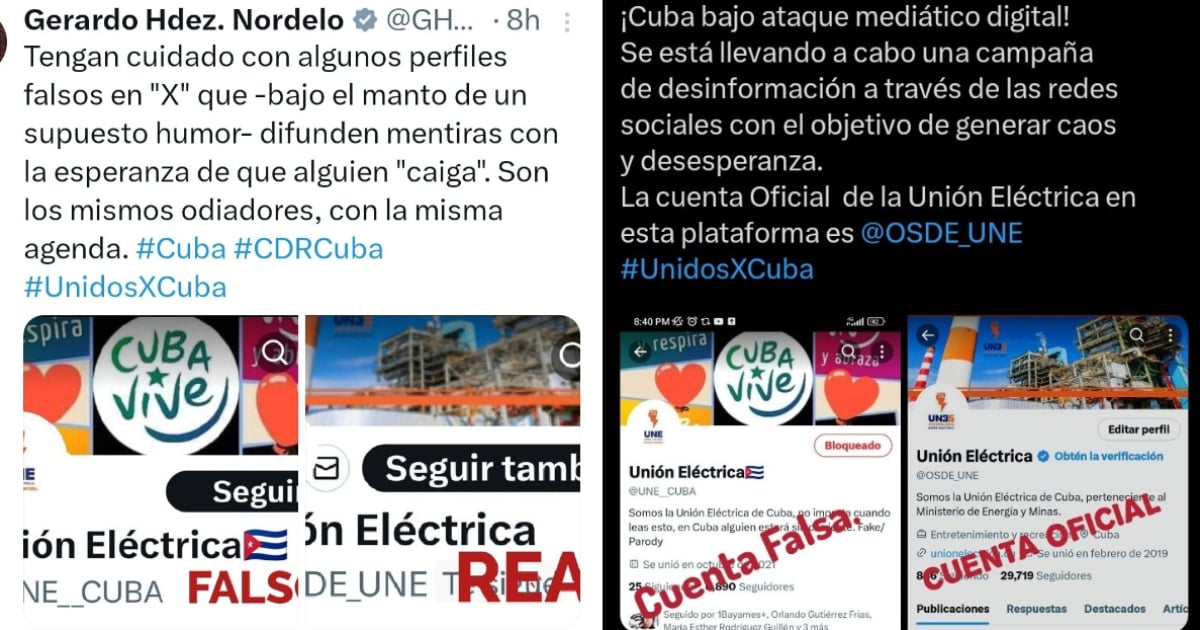The Cuban government's recent backlash against a surge of memes and online criticism reveals the regime's sensitivity to public discontent expressed in the digital realm. This official reaction was triggered when a satirical tweet went viral, which some officials mistakenly perceived as fake news. The tweet humorously mocked the country's energy issues but was seen by authorities as an attempt to spread misinformation.
The parody account posted: “Today's earthquake was caused by the Renté thermoelectric plant; its power surge into the National Electric System triggered a tectonic vibration in the Bahamas, leading to the tremor in Bayamo. We assure the public there's no plan to restart it.” This led high-level officials and state entities to denounce what they called a "digital media attack" aimed at sowing "chaos and despair" among the people.
Official Responses to Online Criticism
Among the leading voices, Susely Morfa González, a member of the Central Committee of the Communist Party of Cuba, warned citizens on social media about a disinformation campaign, urging them not to be "accomplices" to these messages. The Union Eléctrica de Cuba (UNE), criticized for persistent power outages, echoed this sentiment by sharing the parody's message on its official account, using the hashtag #NoFakes and urging users to distrust posts they claim spread false news.
UNE further clarified their official presence on the platform under @OSDE_UNE, distinguishing itself from parody profiles satirizing the country's energy situation. This incident sparked ironic reactions online, with users like @Taoro8 mocking UNE's response: “We all know about @OSDE_UNE's inefficiency, but coming out to debunk a meme amidst five-day blackouts is beyond ridiculous…”
Disconnect Between Government and Citizen Priorities
Others highlighted the contrast between the government's focus on memes and its lack of effective responses to the energy crisis affecting the population. Gerardo Hernández Nordelo, coordinator of the Committees for the Defense of the Revolution (CDR), also joined the official stance. In his X account (formerly Twitter), Hernández urged caution against “false profiles” that allegedly use humor to spread “lies” and “hate” against the regime.
“Beware of some false profiles on ‘X’ that —under the guise of humor— spread lies hoping someone falls for them. They are the same haters, with the same agenda,” wrote the failed spy, recently calling on CDR members to combat on social media. This government reaction sparked debate about the disconnect between the regime's priorities and the people's needs. While Cubans face continuous blackouts, food shortages, and struggles accessing basic services, the government focuses on debunking memes and warning of supposed disinformation campaigns.
Memes as a Form of Resistance
The account @UNE__CUBA joined the conversation, pointing out: “They say we are misinforming and suffering a media attack, yet they post a screenshot clearly stating the account sharing the news is PARODY AND FAKE.” This episode highlights the growing gap between the Cuban regime's official narrative and the reality faced by its citizens. Instead of addressing the root causes of social unrest, such as prolonged blackouts and the economic crisis, authorities blame social media and meme creators for attempting to destabilize the country.
The regime's response to critical memes has been perceived as a failed attempt to control online discourse, which remains a space for expressing societal frustrations. A recent example of repression against meme creators in Cuba involves a nurse, who, in August 2024, faced charges of "disrespect" and could receive up to three years in prison for posting a critical meme on social media.
Memes have intensified during key moments in Cuba's reality. In May 2024, numerous memes emerged mocking the official May Day celebrations, highlighting the disconnect between the country's crisis and the government's triumphant rhetoric. Similarly, in March 2024, the regime's response to citizen protests was widely satirized online, with Cubans using memes to voice their disagreement with government measures.
The regime's reactions have included public denials and digital campaigns to counter criticism. In February 2024, regime supporters launched the hashtag #YoTambienMeErizo, attempting to ridicule the popular reggaeton song “Me Erizo,” which had become a symbol of government rejection. Authorities have also moved to debunk rumors on social media, such as an alleged illegal meat production in Havana in April 2024 and doubts about the country's energy situation in May 2024.
Even figures close to power, like Lis Cuesta Peraza, wife of leader Miguel Díaz-Canel, have been targets of online ridicule, sparking a flood of comments and memes, as was the case with a photo of her holding a puppet. The regime's censorship and repression of digital humor reflect its unease with this form of protest, which effectively penetrates society and exposes systemic failures.
Through official denials, warnings about “false accounts,” and legal proceedings, the government attempts to curb the impact of memes, which have become a tool of resistance in a Cuba striving for spaces of free expression.
